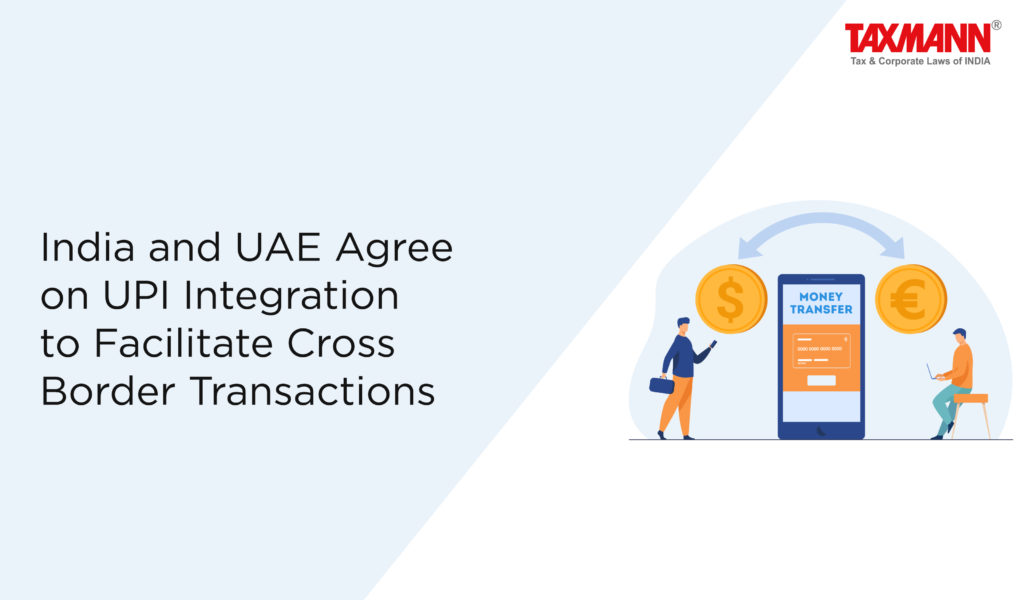India and UAE Agree on UPI Integration to Facilitate Cross Border Transactions
- Blog|News|FEMA & Banking|
- 2 Min Read
- By Taxmann
- |
- Last Updated on 17 July, 2023

Press Release No. 2023-2024/604; Dated: 15.07.2023
The RBI and the Central Bank of the United Arab Emirates (CBUAE) signed two Memorandum of Understanding (MoUs) on 15.07.2023 in Abu Dhabi to establish a framework for promoting the use of local currencies for cross-border transactions and cooperation for interlinking their payment and messaging systems.
The MoUs were signed by the Governor of the Reserve Bank of India, Shri Shaktikanta Das and the Governor of the Central Bank of UAE, H.E. Khaled Mohamed Balama. The MoUs were exchanged between the two Governors, in the august presence of the Honourable Prime Minister of India, Shri Narendra Modi and His Highness Sheikh Mohamed Bin Zayed Al Nahyan, President of the UAE.
The MoU on establishing a framework for the use of local currencies, aims to establish a local currency settlement system (LCSS) to promote the use of the INR and AED bilaterally. The MoU covers all current account transactions and permitted capital account transactions.
The creation of the LCSS would enable exporters and importers to invoice and pay in their respective domestic currencies, which would, in turn facilitate the development of an INR-AED foreign exchange market.
This arrangement would also promote investments and remittances between the two countries. The use of local currencies would optimise transaction costs and settlement time for transactions, including remittances from Indians residing in the UAE.
Under the MOU on ‘Payments and Messaging Systems’, the two central banks agreed to cooperate on (a) linking their Fast Payment Systems (FPSs) – Unified Payments Interface (UPI) of India with the Instant Payment Platform (IPP) of UAE; (b) linking the respective Card Switches (RuPay switch and UAESWITCH); and (c) exploring the linking of payments messaging systems i.e., Structured Financial Messaging System (SFMS) of India with the messaging system in the UAE.
Further, the UPI-IPP linkage will enable the users in either country to make fast, convenient, safe, and cost-effective cross-border funds transfers. The linking of Card Switches will facilitate mutual acceptance of domestic cards and the processing of card transactions.
These two MoUs aim to facilitate seamless cross-border transactions and payments, fostering greater economic cooperation between the two countries.
Click Here To Read The Full Press Release
Disclaimer: The content/information published on the website is only for general information of the user and shall not be construed as legal advice. While the Taxmann has exercised reasonable efforts to ensure the veracity of information/content published, Taxmann shall be under no liability in any manner whatsoever for incorrect information, if any.

Taxmann Publications has a dedicated in-house Research & Editorial Team. This team consists of a team of Chartered Accountants, Company Secretaries, and Lawyers. This team works under the guidance and supervision of editor-in-chief Mr Rakesh Bhargava.
The Research and Editorial Team is responsible for developing reliable and accurate content for the readers. The team follows the six-sigma approach to achieve the benchmark of zero error in its publications and research platforms. The team ensures that the following publication guidelines are thoroughly followed while developing the content:
- The statutory material is obtained only from the authorized and reliable sources
- All the latest developments in the judicial and legislative fields are covered
- Prepare the analytical write-ups on current, controversial, and important issues to help the readers to understand the concept and its implications
- Every content published by Taxmann is complete, accurate and lucid
- All evidence-based statements are supported with proper reference to Section, Circular No., Notification No. or citations
- The golden rules of grammar, style and consistency are thoroughly followed
- Font and size that’s easy to read and remain consistent across all imprint and digital publications are applied



 CA | CS | CMA
CA | CS | CMA
